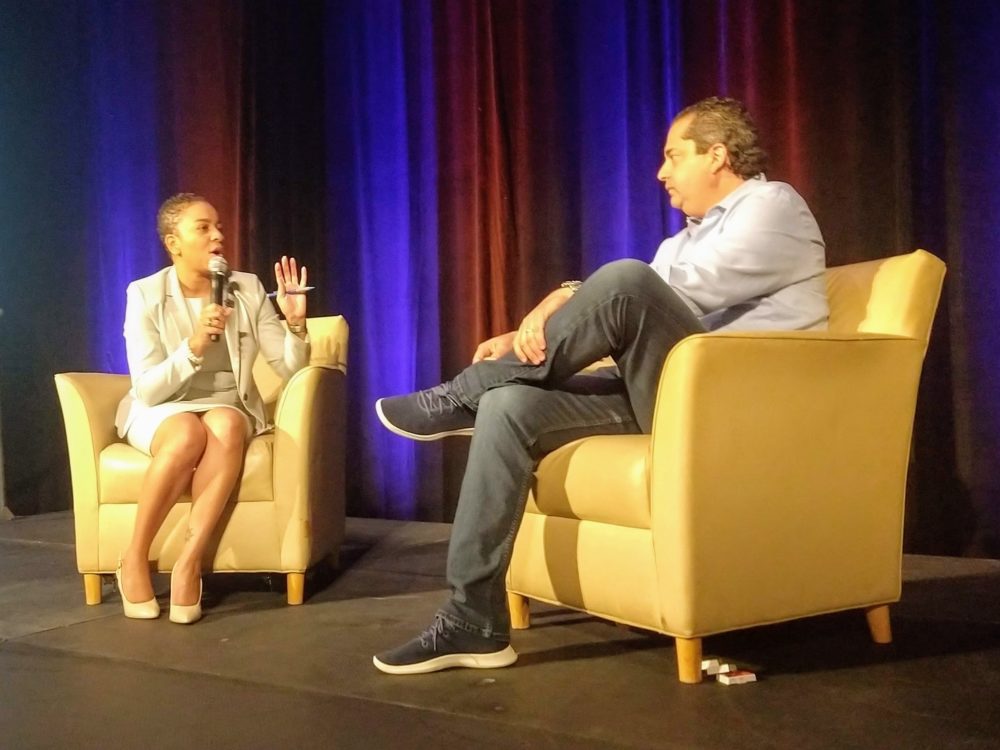Day two of the Millennial Summit (its first-ever second day) was a bit more laid back than the leadership-focused first day. But don’t be fooled: Day two, centered mainly in the Chase Center’s Riverfront Ballroom, was all about the economy’s biggest risk-takers.
Our biggest takeaway of the day: There is no innovation without passion.
From the biotech distruptors to the career-level gig entrepreneurs, passion marked every keynote and panel of the day. NSGFx cryptocurrency trader Devon Jenifer may have said it best during the gig economy panel: “You have to have the mindset of a lion.”
Here’s what else we heard yesterday:
1. Even the most highly favored concepts should be questioned.
Del Johnson, principle at Backstage Capital, a venture capital firm focused on investing in underrepresented founders, shocked attendees when he said that he is “anti mentoring.”
Context, of course, matters: Johnson’s Silicon Valley background (he’s ex-Google) meant immersion in a culture where men of the status quo raised each other up while people like Johnson, who is Black, had to do it himself with little support.
“I find that people often choose mentees that are like themselves,” he said. If the pool of mentors isn’t inclusive to start with, mentoring can become exclusionary — something to be mindful of for organizations and businesses that use mentoring.
"If you can't find a seat, build your own table." – Del Johnson, Principal for Backstage Capital talks about the lack of #inclusion in VC investing. #MILLSUMMIT #netde pic.twitter.com/jnxsjVJ3Y3
— Holly Quinn (@harlequinn823) August 7, 2019
2. Medicine is changing fast.
Genome sequencing, deep brain stimulation (neurological technology that can, for example, make it possible for an amputee to have sensation in a prosthetic limb), AI exam rooms and other biotech innovations are closer than you might think. And costs for once-impossibly expensive DNA technology are “falling faster than Moore’s Law,” according to Jake Becraft, PhD, CEO of the Boston-based Strand Therapeutics.
How can we see to it that insurance will cover necessary preventative and therapeutic tech? That’s the bigger challenge, but Christiana Care Health System Chief Transformation Officer Edmondo Robinson, MD, says alternative payment structures such as Value-Based Payment have the potential to allow physicians to treat patients without as much uncertainty about whether the treatment will be paid for.
Biotech disruptors Jake Becraft, Edmondo Robinson and David Kluger talk passion, innovation and the future of medicine. #MILLSUMMIT #netde pic.twitter.com/NgJhsRIcdF
— Holly Quinn (@harlequinn823) August 7, 2019
3. Every conversation matters.
Humanity counts.
“Do you treat the security guard at the reception desk with the same respect as the CEO?” asked Jack Beeson, head of capital markets at M&T Bank, in his lunchtime remarks. It’s the type of thing potential investors, partners and bosses — the ones you want to do business with, at least — notice.
Don’t be the “person [who] works late, but doesn’t engage with the cleaning staff,” as Beeson put it.
4. Say please and thank you.
Keynote speaker Wayne Kimmel, the Wilmington-born managing partner of sports tech venture capital Seventysix Capital, has learned that the most important part of a deal is whether the person you’re negotiating with is, in the end, a nice person.
“If you wouldn’t want that person calling you in the middle of the night, don’t take their money,” he said.
5. Don’t forget to give yourself a break.
One of the perks of working in the gig economy — whether you do it full-time or as a side hustle — is that you can take a break if you want, far more easily than with a 9-to-5 job. The adrenaline that comes with long hours (and the money that comes with it) can only take you so far, though.
“Breaks are good,” said Ashley Williams, founder and CEO of RIZZARR. “You need to take breaks, or you will get broken.”
Turning a side hustle into a career: "You need to take breaks, or you will get broken," says Ashley Williams, founder & CEO of @RIZZARR #MILLSUMMIT #netde pic.twitter.com/u13EZe0zUf
— Holly Quinn (@harlequinn823) August 7, 2019
Do you have a #MillSummit takeaway we missed? Tweet at us.
Before you go...
Please consider supporting Technical.ly to keep our independent journalism strong. Unlike most business-focused media outlets, we don’t have a paywall. Instead, we count on your personal and organizational support.
3 ways to support our work:- Contribute to the Journalism Fund. Charitable giving ensures our information remains free and accessible for residents to discover workforce programs and entrepreneurship pathways. This includes philanthropic grants and individual tax-deductible donations from readers like you.
- Use our Preferred Partners. Our directory of vetted providers offers high-quality recommendations for services our readers need, and each referral supports our journalism.
- Use our services. If you need entrepreneurs and tech leaders to buy your services, are seeking technologists to hire or want more professionals to know about your ecosystem, Technical.ly has the biggest and most engaged audience in the mid-Atlantic. We help companies tell their stories and answer big questions to meet and serve our community.
Join our growing Slack community
Join 5,000 tech professionals and entrepreneurs in our community Slack today!

The person charged in the UnitedHealthcare CEO shooting had a ton of tech connections

The looming TikTok ban doesn’t strike financial fear into the hearts of creators — it’s community they’re worried about

Where are the country’s most vibrant tech and startup communities?



